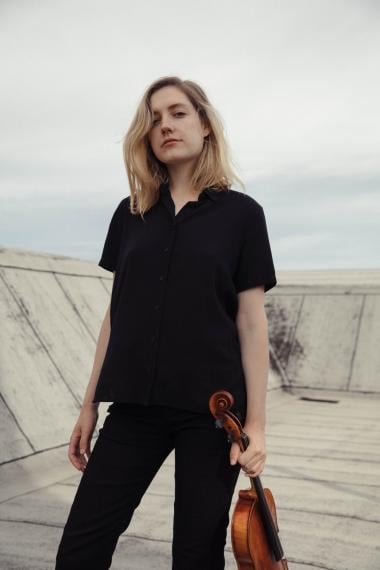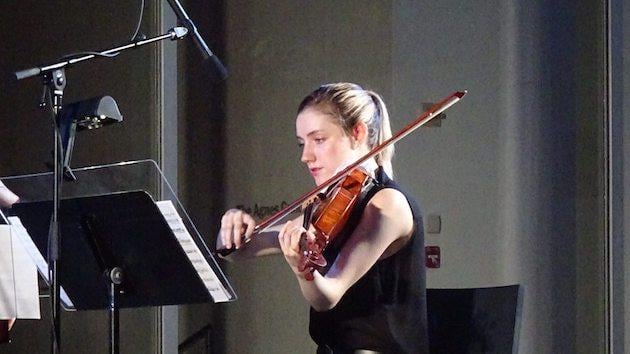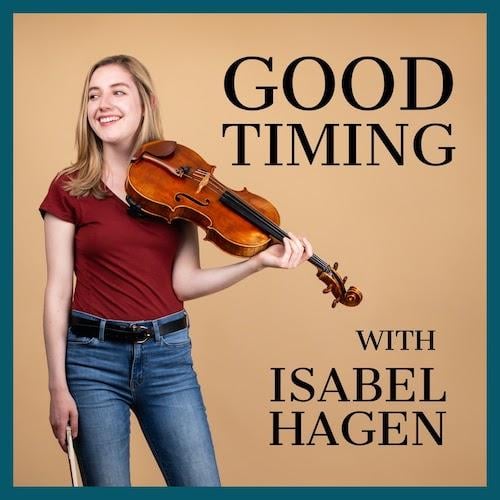
Trained as a classical violist, Isabel Hagen, who earned a bachelor’s and master’s degree from Juilliard, has toured internationally with ensembles including the American Contemporary Music Ensemble (ACME), Alarm Will Sound, and Ensemble Signal. In addition, she has performed and worked with numerous artists such as Björk, Max Richter and Steve Reich. And as a pit musician, Hagen’s Broadway credits range from regularly subbing in Les Misérables and The Lion King to Rocktopia.
But at 29, this New York-born-and-raised musician also has the distinct honor of having made her debut appearance on The Tonight Show Starring Jimmy Fallon — as a comedian. Indeed, Hagen did a set on March 11, 2020 and was the last comic to perform before the quarantine. Last Tuesday, Hagen headlined Happy Hour No. 49, a virtual event presented by Salastina, the L.A.-based organization that has been offering free weekly performances as a way to get up close and personal with myriad artists during COVID-19.
I caught up with Hagen by phone from Los Angeles, where she’s been hunkered down for a few months with her rock-musician boyfriend before returning home to New York.
When I think of comics who’ve been musicians, I think of old-school types such as Henny Youngman and Jack Benny, both of whom made use of the violin in their acts, and pianist Victor Borge. Do you consider yourself a comedian first or a violist first, and how did comedy enter the picture?
Now I would call myself a comedian first. Comedy entered the picture, because I was always geared up to be a violist — join an orchestra or be part of a string quartet — but comedy always interested me. When I was at Juilliard, I had a repetitive stress wrist injury. It wasn’t that bad, but I’d always loved stand-up and went to an open-mic night. I’d had some ideas floating around and that night I wasn’t very good, because to get good at comedy you have to get onstage and try things out in front of an audience, but eventually there’s laughter and you see what works.

Help me out here. What classically trained musician — from Juilliard, no less — actually decides to get up on stage in front of strangers and try making people laugh? Who was your audience, and weren’t you nervous?
Part of me was really nervous, but I was more excited. The audience was five other comedians and it was more of a supportive environment. Of course, there were many times after that that I bombed, but I also started getting laughs.
I understand that you’ve done some 700 open-mic nights. How is that even possible?
By now it’s probably in the 1,000s. There were six years of going up multiple times a night and it would have been more, but I missed a year because of COVID-19.
Okay, so you’d been on Fallon’s show as a musician numerous times, but when you were named a New Face of Comedy in 2019 at Montreal’s “Just for Laughs Festival,” was that how you scored the gig as a comic on The Tonight Show, and what was the response?
Yes, the booker saw me at the Montreal comedy festival and I was then asked to do a formal audition showcase at a New York comedy club. The booker was there and thought I was ready to do it. They videotaped it to make sure everyone approved.
It was super fun for me and I thought it went really well. But the very next day we were all hearing about the shutdown, so that was some good news among the bad news that was about to happen. It felt great, but part of me is happy I got it in before the shutdown and the other part makes me wonder what would have happened next. I can have both a negative and positive view.
But for the Fallon gig, you didn’t whip out your viola and noodle something between jokes. Will that be part of your act anytime soon and what did you do for your Salastina Happy Hour appearance?
I have experimented a bit with combining the instrument with comedy, but not much. I like doing that and want to start exploring that more. When I started doing comedy, I really wanted to know that I could be funny onstage without the instrument. It took me about four years, because they are very separate worlds.
[For Salastina’s Happy Hour], it was a mixture of playing and jokes. It was live with some interview components to it. That’s why bringing in the viola helps. It doesn’t require quite as much of an immediate response. Telling one-liners and then playing is a funny contrast.
That’s an understatement. So, what’s your process in constructing a joke and who inspires you — both comedically and musically?
It’s an idea for something that seems weird or something we take for granted and then I wonder why. I write down a few different things but the bulk of it happens on stage. The first part is the idea, the second is hashing it out and the third thing is being onstage. I’ll try it onstage and if it works, I keep it, if it doesn’t work, like if it’s the first time, I’ll listen back and change a little bit each night.
It’s been so hard [during the pandemic] because I haven’t been able to write new material because I don’t have the third part, which is a stage. Whatever I write, it’s the timing that is so delicate and specific, so I need to be onstage to get the laugh, the live feedback.
I’m inspired by deadpan comedy, like Mitch Hedberg. For me, I like one-liners. You try different personas onstage and feel what works and what feels most natural. For me now, it seems to be deadpan.
[Regarding] musical influences, as a violist I looked to other violists — Kim Kashkashian, Tabea Zimmermann — and looked at all their recordings [including Paul] Hindemith sonatas. The great thing about Hindemith is he wrote something for every instrument. I always loved him. For my first years in the master’s [program] I performed all Hindemith. It was fun for me, but I don’t know if it was for everybody else. I was never interested in writing music, so I didn’t have influences that way, but that’s why comedy was important for me, because I was writing jokes.
Do you feel that the viola is overlooked or underrated?
Maybe the viola was historically overlooked, because no one wrote music for it. Hindemith wrote a big repertory for it and it’s been used in a quartet setting. But just in terms of music written for the viola, it was overlooked in the past, but there’s a ton of contemporary music being written for it now. It has a unique sound and is worth writing for. There are so many good violists out there. I haven’t had a solo piece written for me, but I have played in a viola quartet and at some point, I will get a piece written for me. Anything is possible.

You’ve also got a podcast, Good Timing with Isabel Hagen, in which you talk with other artists about the creative process, performance anxiety and navigating the reality of following your dreams. What was the genesis of the series, which has featured an array of people including actor/writer Eric Bogosian and comics Maria Banford and Andy Kindler.
It’s weekly and I just put out episode 43. I started it during the pandemic and it was inspired by interviews and being asked about music and comedy. I love talking about the connection between different artistic mediums and I get to capture that in each one. I also have an endless amount of people I can interview and it’s been a passion project of mine.
Where do you see yourself in the next five to 10 years?
I think the viola will always be a part of what I do but in the next five to 10 years I hope to do more stand-up and writing. Of course, I see music being involved because I find musicians really fascinating. I’ll always be a musician.

